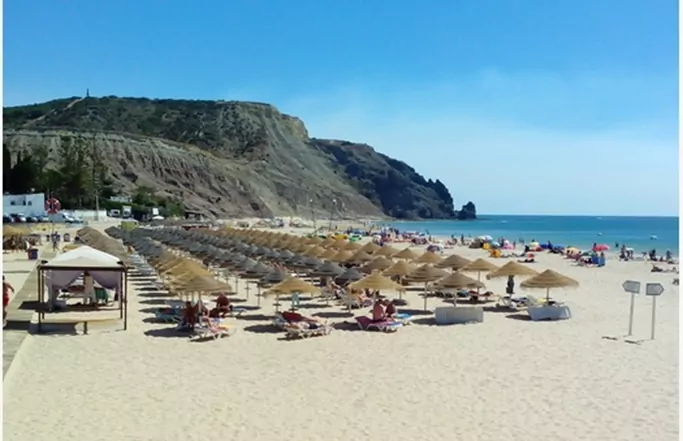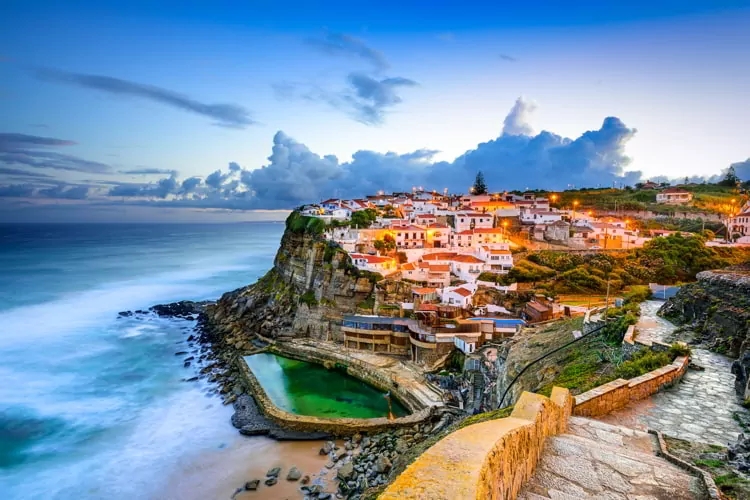How To Buy Property Overseas: Our Portugal Guide
Portugal has been my top all-around destination choice for both lifestyle and real estate investment for the past several years.
It has an awful lot going for it as a country.
More sunshine than California, a low cost of living, and rich history and culture. Portugal also has excellent health care, low crime, and is safe and welcoming for foreigners.
Today I’ll be breaking down the process of buying property in Portugal and the tax implications of moving or renting out a property there.

Do you want to live by the beach or inland? Would you like the convenience of a condo or the privacy of a house on its own lot? Do you see yourself living in a rural area or must your property be in an urban area for easier letting?
Do you want the ease of management of living in a development with an HOA or do you hate the idea of obeying rules in your own home?
Are swimming pools, nightlife, community amenities, or schools a deal breaker for you?
These questions only you can answer…
Before we get into it, these are some things to keep in mind about local service providers:
- Real estate agents vary in quality and legitimacy. Ensure anyone you are dealing with is a member of the AMI (Associação dos Mediadores do Imobiliário) by checking the IMPIC website for their membership. Ask them if they have dealt with foreign buyers before, and check that their level of English is sufficient to communicate with you. Do some research online before and after contacting any realtor’s offices. This will give you a chance to get a feel for the various areas and prices.
- Mortgage advisors are very useful if you need to finance your purchase. Be aware that most banks will only finance your property until you are 65 or at most 70 years old. If you need longer financing you will need a guarantor. Non-residents can get a maximum mortgage of 60% to 70% loan-to-value. Tax residents can get up to 80% loan-to-value.
- Retain a lawyer to protect your interests. It might be technically possible to handle the process yourself with a notary, but we don’t advise it.
- If your cash is held in a currency other than euros you can save thousands of dollars by using a money transfer service like TransferWise.
- Unless you are buying a newly built home, get a surveyor to examine the property you are buying to ensure there are no issues.
- If you are buying pre-construction, ensure that you are getting a bank guarantee on your payments. This means the bank will refund your money paid if your unit doesn’t get built.
Portuguese Property Buying Process
- Get a NIF number from the town hall. This registration number costs a nominal fee and is important for many transactions in Portugal.
- Retain a local lawyer experienced in property transactions.
- Make an offer on a property you want to buy.
- If the offer is accepted make a small reservation deposit to hold the property while you conduct due diligence.
- Hire a surveyor to review the property.
- Sign a Promissory Contract (Contrato de Promessa de Compra e Venda) in front of a notary.
- Have your lawyer conduct all the necessary due diligence. This includes ensuring the seller is entitled to sell the property, that there are no outstanding debts or liens on the property, that the property is correctly registered with the Lands Registry, and that it has the necessary building permissions.
- Pay a deposit of 10% to 30% less the small reservation deposit paid initially. This is usually non-refundable. If the seller backs out of the deal after this stage, they must pay you a penalty of twice the deposit.
- The transfer date is agreed by the lawyers. Be aware that this takes up to three months from this stage.
- On the day of transfer, you can go with your lawyer to the notary’s office or have the lawyer handle it for you by giving them power of attorney.
- The notary reads the contracts aloud, and the transfer paperwork is signed.
- You pay the balance of the purchase price and the transfer taxes with a bank draft or wire transfer.
- Your lawyer registers the property with the local tax office and Land Registry.
Financial Considerations: Taxes In Portugal
Portugal has a medium to high rate of taxation, for which residents get a reasonably high level of services, including subsidized health care, education, and transport.
However, the Non-Habitual Tax Resident status allows a 10-year tax break on all foreign-sourced income and a reduced 20% tax rate on Portuguese-based income. You also avoid any wealth taxes or gift taxes normally applicable.
Qualifying for NHR requires you to comply with one of these criteria:
- Have EU or EEA citizenship…
- Get a Golden Visa, which means making a 500,000-euro investment in residential real estate in the interior of Portugal, or a 500,000-euro investment in commercial property anywhere in Portugal…
- Have a high value-added profession like architecture, IT, tax consultants, designers, among others…
- You cannot have been tax resident in Portugal at any time over the past five years…
- Show proof of residence in Portugal in the form of a title or lease.
If you don’t qualify for NHR but still want to move to Portugal, you will pay taxes at the normal rates if you become a tax resident.
Tax Residency
If you reside in Portugal for 183 days or more in a single calendar year you will become a Portuguese tax resident. Other trigger factors are if you have a permanent residence in Portugal on Dec. 31 of that tax year, and if the head of your household is a tax resident in Portugal.
The non-resident income tax is a flat 25% on locally earned income.
Resident Portuguese income tax rates vary from 14.5% to 48%, see the chart below for the increments.
Resident married couples can share their reported income to avail of lower tax brackets.
A solidarity tax of 2.5% to 5% is levied on income over 80,000 euros. Ireland introduced a similar tax after the 2008 crash, as well.
A sales tax called VAT is 23% at the normal rate, 13% for the intermediate rate, and 6% for the reduced rate.
Property tax is 0.3% to 0.45% for urban property and rural property is taxed at 0.8% of value.
Portugal isn’t interested in entertaining shady investment funds. Property held by offshore entities incorporated in “blacklisted jurisdictions” for money laundering is taxed at 7.5% of its value.
There is no wealth tax in Portugal but there is a 0.7% property value tax for real estate valued at over 600,000 euros, which rises to 1% after 1 million euros in value.
Gifts and inheritance are taxed at 10%.
The property transfer tax is called IMT. There is no tax on properties valued at less than 92,407 euros. The tax jumps from 2% to 5% after 126,000 euros in value, and is 5% over 172,000 euros.
IMT on property held by entities incorporated in offshore tax havens (blacklisted jurisdictions) is 10%. This means it’s not worth it to use low-tax offshore structures to hold your Portuguese property.
There is a separate stamp duty of 0.8% on property transfers and a 0.6% stamp duty on mortgages if you require one.
Notary fees are 1% to 2% to handle the title transfer process.
VAT on new developments is 23%, so if you’re buying in a new development, you need to confirm the price you are quoted includes VAT.
Capital gains tax is 28% for non-residents.
Residents pay CGT on 50% of any capital gains from property at their marginal income tax rates varying between 14.50% and 48% (plus the solidarity rate, if applicable).
Rental income is taxed at 28%, but you can deduct all expenses except finance costs, depreciation, furniture, appliances, and decorations. You can even claw back eligible expenses from up to 24 months prior to the rental.
Resident Income Tax Rates For 2022
| Taxable income (EUR) | Tax rate (%) | Deductible amount (EUR) | |
| Over | Not over | ||
| 0 | 7,116 | 14.5 | 0 |
| 7,116 | 10,736 | 23.0 | 604.86 |
| 10,736 | 15,216 | 26.5 | 980.63 |
| 15,216 | 19,696 | 28.5 | 1,284.99 |
| 19,696 | 25,076 | 35.0 | 2,565.21 |
| 25,076 | 36,757 | 37.0 | 3,066.79 |
| 36,757 | 48,033 | 43.5 | 5,455.84 |
| 48,033 | 75,009 | 45.0 | 6,176.56 |
| 75,009 | 48.0 | 8,426.51 | |
Portugal Property Pick: Beach Property On Algarve’s Coast
This offer is for a two-bedroom, two-bathroom condo starting at 475,000 euros.
This development is a community within a community. Aimed at the discerning retiree or pre-retiree who wants access to a range of on-site amenities but also to be within walking distance of all that the local town has to offer.
This is a safe condominium development while remaining totally integrated with the local town… and all within walking distance of a top beach.

With savings like this on the table, it’s time to seriously consider making a move on Portuguese property, before the exchange rates change.
Go here to find out what returns this dollar-discounted euro investment can earn you.
Con Murphy
Editor, Overseas Property Alert

